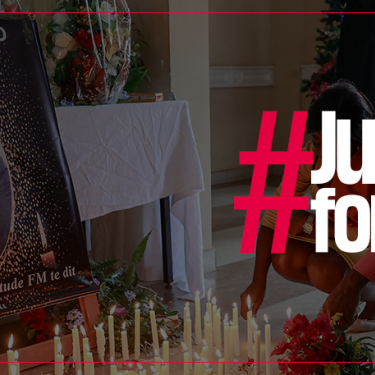More damning evidence in Martinez Zogo murder investigation in Cameroon

Reporters Without Borders (RSF) can reveal that the contents of mobile phones and interrogations have yielded new, very incriminating evidence in the investigation into journalist Martinez Zogo’s murder in Cameroon. Businessman Jean-Pierre Amougou Belinga is more deeply implicated than ever and the net is closing on justice minister Laurent Esso, one of the pillars of the Cameroonian government.
The joint gendarmerie-police investigation is moving ahead quickly and, at this rate, is liable to eclipse President Paul Biya’s 90th birthday on 13 February. It is Biya, Cameroon’s president since 1982, who ordered the investigation into Martinez Zogo’s abduction, beating and murder by intelligence officers on the evening of 17 January. But he must surely realize to what extent the case is liable to cast a heavy shadow over the final period of his presidency and perhaps remove one of its most loyal allies.
As RSF already revealed, the initial arrests of around 20 members of Cameroon’s General Directorate for External Investigations (DGRE), including its boss, the feared Maxime Eko Eko, and its special operations director, Justin Danwe, led to the arrest on 6 February of Belinga, a prominent businessman, who owns the newspaper L'Anecdote and the TV channel Vision 4.
RSF has been told in confidence that evidence of Belinga’s role as the leading instigator of Zogo’s murder has continued to grow. The statements provided by the six members of the unit who abducted and killed Radio Amplitude FM’s director – and who were mainly recruited from outside Yaoundé, the capital, as RSF has now learned – have corroborated the staggering statement made by Danwe, which RSF already reported.
Their statements and other evidence have also confirmed Belinga’s presence at the scene of the murder. And examination of the phones of the suspects has confirmed that calls were made between Belinga and Danwe, and between Belinga and justice minister Laurent Esso, on the evening of the murder. In view of the growing volume of evidence, a reconstruction of the murder – envisaged in recent days – no longer seems to be a priority for the investigators, RSF has learned.
He “wanted to finish with him”
Sources very close to the investigation report the discovery of damning new evidence of a payment of 35 million CFA francs (about 53,000 euros) from Belinga to Danwe. This money allegedly passed through the account of Retired Colonel Etoundi Nsoé, the former presidential guard commander who is Belinga’s father-in-law and unofficial head of his security. Nsoé was arrested on 6 February, as was Bruno Bidjang, the head of the Belinga’s media group, who is reportedly cooperating with the investigators. A face-to-face confrontation between these two men was scheduled to take place today.
Finally, RSF has interviewed two people in the past two days who say Zogo had been threatened by Belinga or people close to him. And RSF has heard a recording in which Zogo voiced concern on 9 January – eight days before his murder – about the fact that he had been contacted by a man “very close to [Belinga].” This man had told Zogo that Belinga “wanted to finish with him” and with at least eight other Cameroonian journalists.
When contacted by RSF, Belinga’s lawyer, former bar association president Charles Tchoungang, claimed that no legal procedure had been respected since the start of what he called a “unilateral investigation.” He insisted that “warrantless searches” had been carried out, that the prosecution case was “empty,” and that it had the subject of a “manipulation unacceptable to public opinion.”
Sights now turned on Laurent Esso
The investigators are now focusing on the role that Esso, the justice minister, may have played. “We have proof that he was deeply involved,” said one of the investigators, refusing to elaborate. A government minister in six successive administrations since 1996 and one of President Biya’s oldest political allies, Esso has been under close surveillance in the past few days. Gendarmes were posted close to his home although there was no question of any threat to his security.
Belinga, who is being held in a cell at the defence ministry, has asked several times to call Esso, but his request has not been granted. RSF has meanwhile learned from a very reliable source that Belinga spent more than an hour in Esso’s office on 3 February, several days after first falling under heaving suspicions.
Despite several attempts, RSF has not been able to reach Esso.
Purveyors of disinformation identified
The evidence against Eko, the DGRE’s boss – who is being held in a cell near Belinga’s – also seems to be damning. He is the owner of the Prado SUV used to abduct Zogo. “It’s hard to imagine his men borrowing it without telling him,” one of RSF’s sources said. He also “had his share,” the source added, alluding to the sums of money paid to the participants in the operation.
The military justice system and the Government Commissioner are now in charge of the case. The 31 suspects already in provisional custody should be charged and placed in pre-trial detention, probably in Yaoundé’s main prison, by the end of the week. Who will join them? How high does the level of complicity go? The investigation is continuing and around 100 people are now regarded as “persons of interest” in the case.
Those who have been taking turns to spread disinformation since the start of the case – and who have targeted RSF, among others – could also be questioned. The investigators say they have found evidence of payments – ranging from a few hundred to several thousand euros –made by Belinga associates with the aim of discrediting reports unfavourable to him, rehabilitating him or creating diversions in order to influence the investigation or public opinion. At least 18 persons had been identified by yesterday evening.
